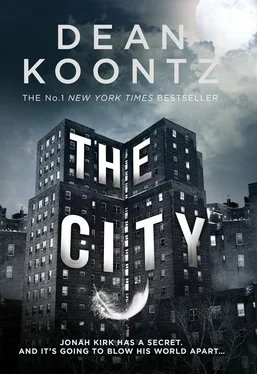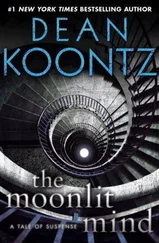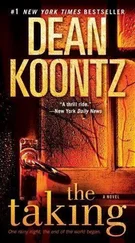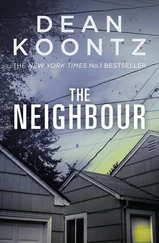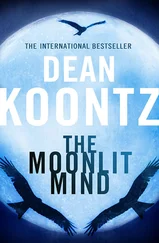I knelt with my back pressed to the metal wall, trying to be still, cupping both hands over my nose and mouth, not because of the stench but to soften the sound of my breathing. His shoes slapped loud on the blacktop and on the bricks where the blacktop had worn off, and as he passed me, he was panting louder than I was. He came to a halt about where I figured the back door to our building must have been, and I listened to him muttering in frustration and making small noises for which I couldn’t account.
I began to wonder if I had done the right thing by fleeing from him. He was my father, after all, not a good one but my father nonetheless. Maybe I’d misjudged his mood and was mistaken about his intentions.
When he began to curse and when my name proved to be part of it, I stopped worrying that I’d been unfair. He rattled the knob and kicked the door hard. I didn’t understand what had foiled him. The superintendent had cut new keys to our apartment; but Tilton still possessed the other key, the one to the back stairs, which unlike the front entrance was kept locked. He became increasingly agitated, cursing explosively, and when he repeatedly kicked a Dumpster—not mine but one nearby—I figured he’d been drinking. The big trash bin gave off hollow drumlike beats that echoed along the alleyway— boom, boom, boom. A man shouted from a high window, “Knock it off!” Tilton shouted back at him, cursed him out, and the man said as if he meant it, “I’m comin’ down there, you bastard.” My father hurried away then, but no one came down to look for him. Comparative quiet settled over the alleyway, disturbed only by the muffled sounds of traffic out on the main street and by music and voices from a TV channeled through an open window overhead.
Suspicious, I waited a few minutes. But I couldn’t spend the night in the Dumpster, and finally I climbed out. I half expected a shadowy figure to break from cover and rush at me, but if there were rats in the alley, they were genuine rodents, nothing more.
Above the rear door to our building, the lamp protected by a wire cage had not been broken, and by its light I saw the bent key protruding from the deadbolt lock. In his eagerness to nab me before I got back to the apartment, my father evidently had inserted the wrong key, and when it wouldn’t turn, he forced it, nearly breaking it off in the lock. I wiggled it, trying to extract it from the keyway. The key was bent not just at the shoulder, but also along the blade, and its serrations were wedged in the pin tumblers. In the morning, the superintendent would need to take the lock apart to remedy the situation. In the meantime, I could return to the building only by the front entrance.
The blush of twilight had faded to maroon, but the streetlamps hadn’t yet brightened. Shadows filled doorways. The headlights of passing vehicles flared off the parked cars, revealing or conjuring sinister figures inside them; it was impossible to tell which. I expected my father to throw open a car door and scramble after me or to rise up from between cars, but I made it to our building and pelted up the steps and into the foyer, almost knocking down Mr. Yoshioka.
He said, “Is it true, is the poor man dead? It cannot be true, so young.”
For a moment, I thought he was referring to my father, but then I remembered, and I assured him that Mr. Lorenzo had died.
“I am so entirely sorry. He was a nice man. Thank you very much.”
I said he was welcome, although I didn’t know what he might be thanking me for, and I ascended six flights to the fourth floor. I didn’t dare to race up because maybe my father was waiting for me around one turn or another, but neither did I proceed slowly, because maybe he would suddenly appear on the stairs behind me.
When I let myself into the apartment and closed the door and engaged both deadbolts, I’d been gone no more than ten minutes. Mrs. Lorenzo still sat at the kitchen table with my mother, and she still wept, though the wrenching sobs had passed for now. Neither of them knew that I’d gone out.
At one of the living-room windows, I peered down at the swarming street as light bloomed in the frosted glass of the lamps, and they seemed to float like aligned and miniature moons in the early dark. Every pedestrian interested me, every driver of every vehicle, and though none of them proved to be my father, I didn’t grow bored with sentry duty. If he had come back once, he would come back again, as though a bad-juju penny rattled within the hollow space inside him, a penny with two heads and both of them my face, by its every clink and spin reminding him of me and of how my mother would be devastated if she lost me.
After a while, my mom came to me and put a hand on my shoulder and said, “Are you all right, Jonah?”
That didn’t seem to be the best time to tell her about Tilton. Mrs. Lorenzo needed her.
“Yeah, I’m okay. It’s awful, though. How’s Mrs. Lorenzo?”
“Not good. Tony was an immigrant. He has no family in America. Donata’s father died when she was young, and she has no brothers or sisters, and I gather her mother’s … well, difficult. There’s nowhere she can go but back to their apartment, and she can’t face that right now. Maybe tomorrow. I’ve asked her to stay the night with us. She can have your bed, and you can sleep in mine.”
I looked out at the street and then at the sofa, to which I pointed. “Can I sleep there?”
“The bed would be more comfortable.”
“Well, sleeping with your parents, a parent, whatever, it’s for scared little kids, it’s little-kid stuff.”
“When did it become little-kid stuff?”
I shrugged. “I don’t know. A while ago, weeks ago maybe. I mean, I’m nine. ”
Sometimes it seemed that she could look right into my head and read my thoughts, as if my forehead were glass and my brain a neatly printed scroll. “Are you sure you’re all right, sweetie?”
She never lied to me, but I didn’t always measure up to her when it came to truth-telling, although this wasn’t lying, not really. I intended just to withhold the truth from her for a few hours, until Mrs. Lorenzo gathered the courage to go downstairs to her apartment in the morning.
“See, the sofa is … cool. Not kid stuff.” I sounded so lame, and I could feel the blush burning in my cheeks, but one of the benefits of dark skin is that a blush can’t give you away even to your perhaps psychically gifted mother. “The sofa is like an adventure. You know? The sofa is righteous.”
“All right, Mr. Jonah Kirk. You may sleep on the sofa, and I’ll lie awake all night worrying about how soon you’ll want to drive a car and date grown women and go away to war.”
I hugged her. “I’m never going away anywhere.”
“You go strip your bed and put on clean sheets for Donata. I’ve got to dash downstairs and get her pajamas and some other things she needs. She just falls to pieces at the thought of going back there even if I’m with her.”
Here at the front of the building, they hadn’t heard the ruckus in the alleyway, Tilton kicking the Dumpster and cursing.
“You shouldn’t go there alone.” When she gave me an odd look, I said, “I mean, not this late.”
“Late? It’s twenty past nine and it’s just downstairs. If this was a work night, sweetie, I’d be coming home alone hours later, just me with a pretend gun in my purse.”
“Well, but Mr. Lorenzo died down there.”
Although we were speaking softly, she glanced toward the kitchen and lowered her voice further. “He didn’t die of disease or anything, Jonah. And in this family, we believe there’s only one ghost this side of Heaven, and it’s the holy one.”
Читать дальше
